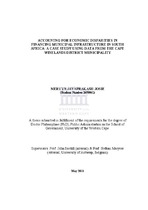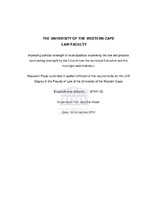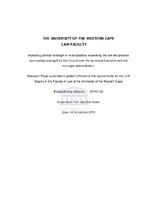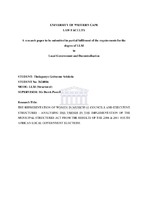| dc.contributor.advisor | Bardill, John | |
| dc.contributor.advisor | Marysse, Stefaan | |
| dc.contributor.author | Josie, Mervyn Jayaprakash | |
| dc.date.accessioned | 2014-06-24T09:17:24Z | |
| dc.date.available | 2014-06-24T09:17:24Z | |
| dc.date.issued | 2011 | |
| dc.identifier.uri | http://hdl.handle.net/11394/3399 | |
| dc.description | Philosophiae Doctor - PhD | en_US |
| dc.description.abstract | In this thesis I argue that by taking account of economic disparities and
backlogs in intergovernmental infrastructure grants to municipalities in
South Africa, government will effectively meet its constitutional obligation
to equitably allocate infrastructure grants to local government according to
the principles of parity, proportionality and priority (Young, 1994).
Municipalities will thus be able to provide basic services to households in
keeping with the Bill of Rights of the Constitution of South Africa (1996).
Adapting the Petchey et al (2004) provincial capital expenditure grant model to the provision of municipal services using secondary data and information from local municipalities in the Cape Winelands District, I evaluate whether government’s existing municipal grants are allocated equitably and, whether they account for disparities that differentiate municipalities from each other. The findings from my analysis show that the current approach to financing municipal infrastructure does not sufficiently account for disparities and thus, undermines the requirement for equitability, adequacy and efficiency of intergovernmental allocations. Consequently, the right of citizens to basic municipal services is compromised and the macroeconomic structure is weakened. Furthermore the institutional arrangements for local government autonomy is undermined because municipalities cannot ensure stability, predictability, flexibility and economic efficiency of infrastructure budgets. As municipalities receive part of their finance from national government through infrastructure grants, I used data from five local municipalities to examine the extent to which there is equitability and efficiency in the way this finance is allocated. To this end I constructed and applied a composite
disparity index for each municipality to my adapted municipal infrastructure grant model to analyze and observe the impact of economic disparities in grant allocations. The findings show that a grant model that accounts for economic disparities satisfies the constitutional, economic and institutional considerations that should inform municipal grant allocation decisions. I conclude the thesis by highlighting the limitations and possibilities of using a municipal infrastructure grant model that accounts for economic disparities and, I propose some recommendations for applying such a model in South Africa. | en_US |
| dc.language.iso | en | en_US |
| dc.publisher | University of Western Cape | en_US |
| dc.subject | Allocation | en_US |
| dc.subject | Backlogs | en_US |
| dc.subject | Basic municipal services | en_US |
| dc.subject | Capital stock | en_US |
| dc.subject | Cape Winelands District Municipality | en_US |
| dc.subject | Constitution | en_US |
| dc.subject | Economic disparity | en_US |
| dc.subject | Intergovernmental fiscal relations | en_US |
| dc.subject | Municipal infrastructure grants | en_US |
| dc.subject | South Africa | en_US |
| dc.title | Accounting for economic disparities in financing municipal infrastructure in South Africa: a case study using data from the Cape Winelands District Municipality | en_US |
| dc.type | Thesis | en_US |
| dc.rights.holder | University of Western Cape | en_US |




